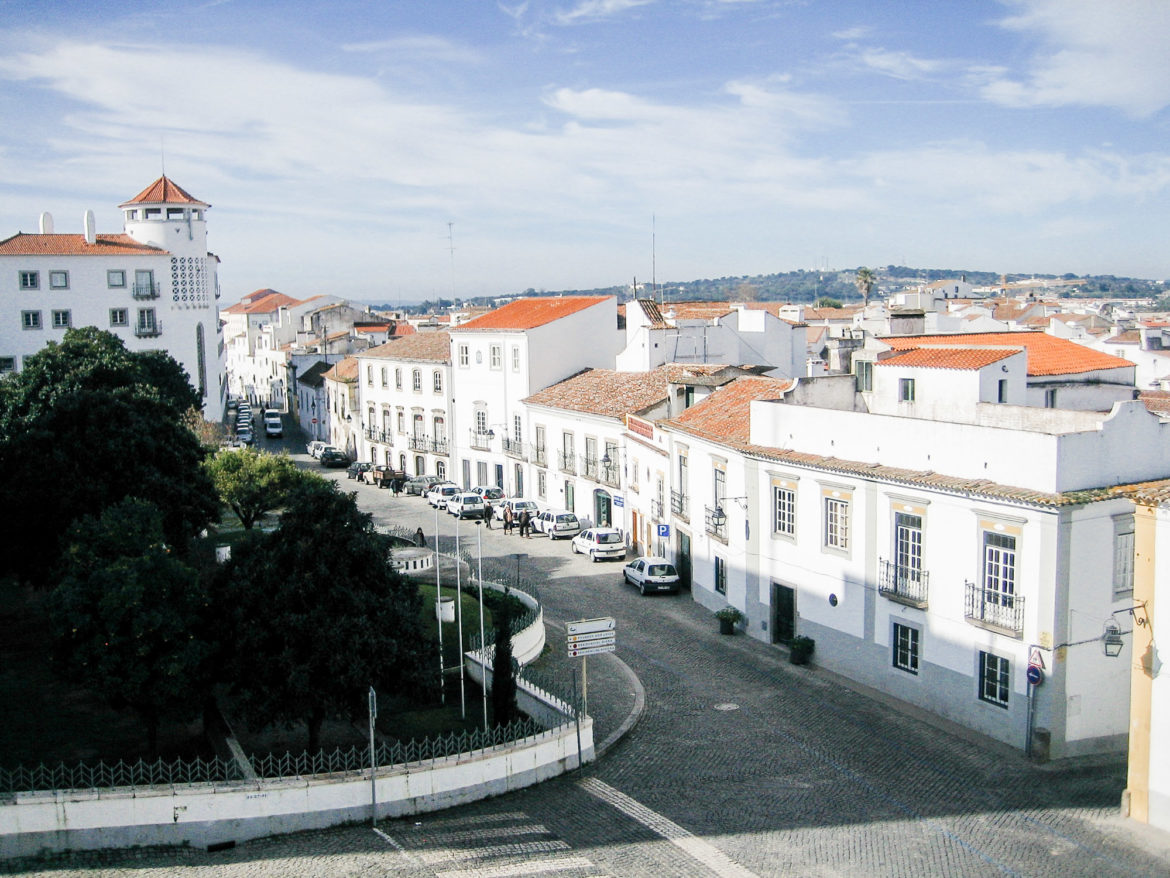Two hours east of Lisbon lies the whitewashed town of Evora, where Roman ruins meet a chapel of bones.
In a way, Evora felt like the official start of our backpacking trip because it marked the point when our unscripted travels began. In Lisbon, our first stop, we planned most everything in advance. Now, we were true vagabonds. Making our inaugural overland trip, we arrived in Evora with no plans and no reservations. Fortunately, a quick, ten minute walk from the bus station put us in the city center. We found a nice, reasonably priced pension to check into and by 10:30am, were out exploring.
When daily life consists solely of wandering, it’s amazing what you can accomplish in 24 hours.
After a picnic lunch among roaming peacocks in the Jardim Publico de Evora (Public Gardens of Evora), we marveled at the 1st c. AD Roman Temple of Evora. We then headed over to the grisly Capela dos Ossos (Chapel of Bones) and studied the perfectly art directed skeletons of 5000 Franciscan monks who were resting in peace (and pieces.)
In the Igreja de São Francisco church, we observed the curious contrast of Portuguese voyage motifs alongside gory Jesus mannequins. The presence of blood and suffering was a reoccurring theme of Catholic churches in Europe, particularly in Portugal and Spain. The unsettling, alarming depiction of Jesus’ life greatly differed from our conservative Episcopalian upbringing in the states.
For dinner, the owner of a cyber café recommended local eatery, Adego do Neto, where no one spoke English (a good sign.) After multiple attempts, we managed to articulate, Do que você gosta? (What do you recommend?) Within minutes, two traditional dishes appeared: cataplana, braised pork with steamed mussels in a white wine garlic sauce, and bitoque de porco, pork chop with a fried egg. Each dish was accompanied with a huge mound of batatas fritas (French fries) and a 1€ glass of house red wine from the Alentjo region. Perfeito.
Back at our pension, we met up with a young woman and man from Paris and West Africa, respectively.
They had just gotten in from Seville, Spain where we were headed next. The impromptu conversation that followed was the first of many interactions we’d have with other travelers during our time abroad. It’s always comforting to talk with people we meet on the road. Perhaps because we’re far away from our respective homes, friends and family. Or maybe because we’re like-minded. In any case, we spent the next hour or so getting the couple’s recommendations and swapping stories about the places we’d been and where we hoped to go next.
The instantaneous connection with other travelers is a reminder of how much we need, and desire, human interaction.
As the clock struck midnight, Margarita, the pension owner, gave us a stern shush from her room. It was time to go to sleep in Evora. We said our goodbyes and wished them well, knowing we’d likely never see them again. We got into bed, feeling relaxed and strangely at home. Full of gratitude for this chapter in our lives.
Where are you going in such a hurry, traveler?
Stop. Do not proceed. You have no greater concern than this one,
That on which you focus your sight.
Recall how many have passed from this world.
Reflect on your similar end. There is good reason to reflect.
If only all did the same.
Ponder, you so influenced by fate.
Among the many concerns of the world.
So little do you reflect on death.
If by chance you glance at this place,
Stop. For the sake of your journey.
The more you pause. The further on your journey you will be.
Written by: Fr. António da Ascenção (translation by Fr. Carlos A. Martins, CC), The Chapel of Bones – Evora, Portugal
Lodging: Casa Palma | Food: Adego do Neto | Activities: Public Gardens of Evora, Temple of Evora, Chapel of Bones, Igreja de São Francisco church

